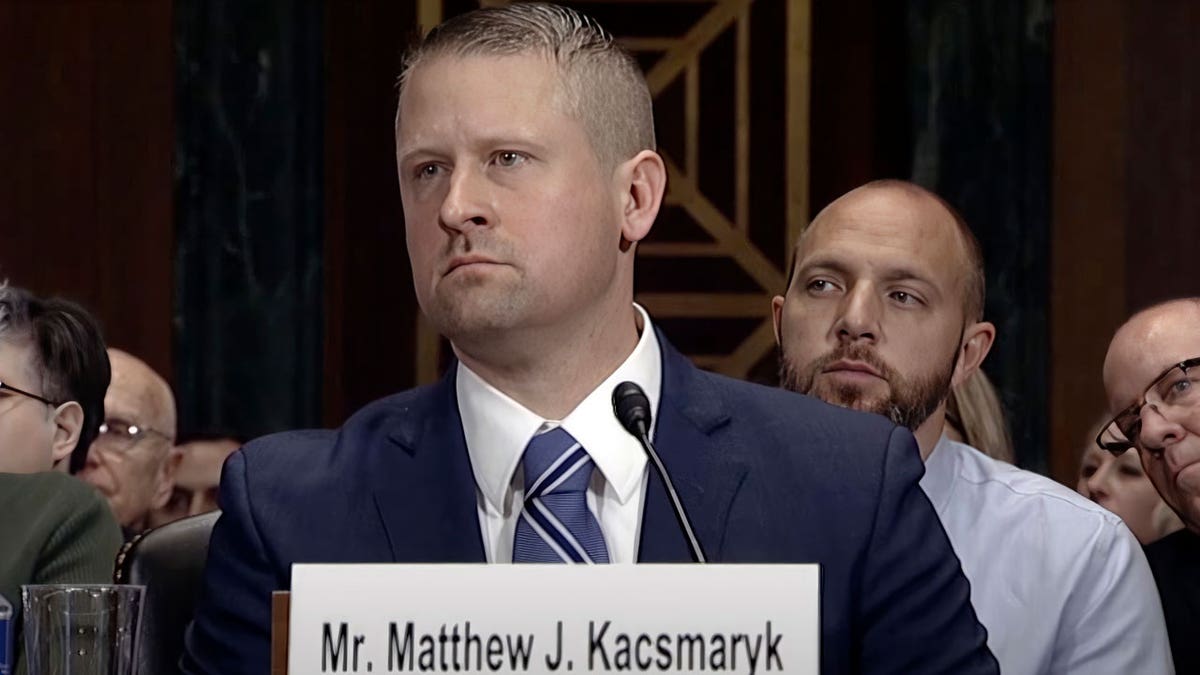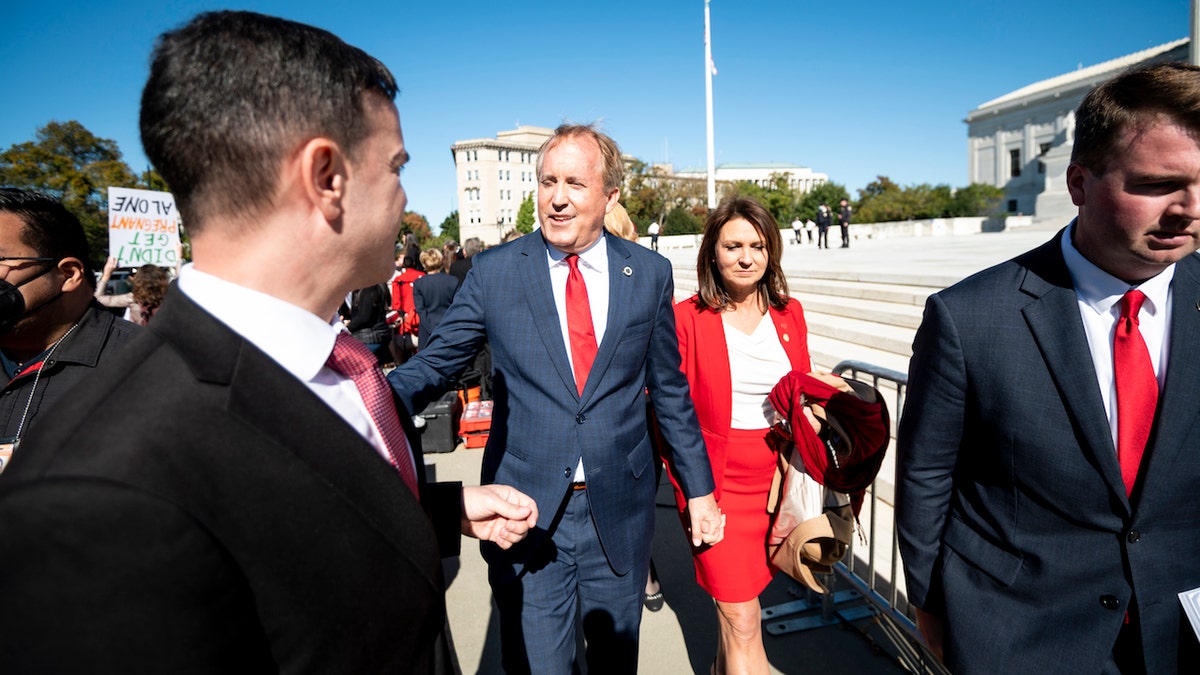Politics
House Dems seeking re-election seemingly reverse course, call on Biden to 'bring order to the southern border'

Five vulnerable Democrats who voted against measures to strengthen border security in the past have seemingly changed their tune as they seek re-election to their posts in the lower chamber.
Following President Biden’s signing of a $95 billion package with aid to both Ukraine and Israel last week, five Democrats – Reps. Jared Golden of Maine, Marie Gluesenkamp Perez of Washington, Mary Peltola of Alaska, Vicente Gonzalez of Texas and Don Davis of North Carolina – released a joint statement agreeing with calls for Congress and the president to “act and bring order to the southern border.”
“Beyond defending our allies, we strongly agree with the National Border Patrol Council that Congress and the President must act and bring order to the Southern border,” the lawmakers stated. “That is why we also voted for H.R. 3602 on Saturday, and why we all voted last month for $19.6 billion for Border Patrol so that it could ramp up its efforts to secure the border.”
The comments from the five Democrats – three of whom (Golden, GluesenKamp, and Davis) are engaged in tough re-election battles that have been labeled “toss up” races by the Cook Political Report, and another two (Peltola and Gonzalez) competing in races labeled “lean Democrat” – came after each one of them voted against the Secure the Border Act of 2023.
VULNERABLE HOUSE DEMS DO A U-TURN ON ILLEGAL IMMIGRATION AFTER CALLING CRISIS ‘NON-EXISTENT THREAT’
Five House Democrats – Reps. Jared Golden of Maine, Marie Gluesenkamp Perez of Washington, Mary Peltola of Alaska, Vicente Gonzalez of Texas and Don Davis of North Carolina – released a statement last week agreeing with calls for Congress and President Biden to “act and bring order to the southern border.” (Getty Images)
That bill, which passed in the House, would have expanded the type of crimes that make someone ineligible for asylum, limited the eligibility to those who arrive at ports of entry, mandated a system similar to the E-Verify employment eligibility verification system, and created additional penalties for visa overstay.
In addition to not supporting the Secure the Border Act, the same five Democrats voted on two different occasions against GOP-led efforts to impeach Homeland Security Secretary Alejandro Mayorkas, whom many Republicans have argued is largely responsible for the migrant crisis at the southern border.
Certain Democrats, like Gluesenkamp Perez, who was first elected to Congress in 2022 and co-chairs the Blue Dog Coalition with Golden and Peltola, have made dismissive comments about the border crisis in recent years.
The Washington lawmaker previously faced criticism from Republicans over border-related comments she made in March 2023 during an appearance on Pod Save America, which came prior to the ending of the Title 42 public health order.
“Listen, nobody stays awake at night worrying about the southern border,” she said at the time. “That’s just not… people stay awake at night worrying that their kid is gonna relapse or that, you know, someone’s going to drop out of school or they’re going to lose their house.”
Gluesenkamp Perez was also one of many Democrats who defended Mayorkas amid calls for his impeachment earlier this year, saying it was “frustrating to see” Republicans push for his ouster because “he doesn’t set policy, he implements it.”
Despite her past remarks, Gluesenkamp Perez has been critical of Biden’s handling of the border crisis in recent months, saying in April that she voted in support of H.R. 3602, which provides for criminal penalties for certain conduct that interferes with U.S. border control measures, because “President Biden has failed to end the crisis at our Southern Border.”
“Every country has an obligation to protect its citizens and secure its sovereign borders, and H.R. 3602 focuses on the urgent need to restore operational control of the Southern Border. Unlike the unworkable and un-American immigration proposals pushed by far-right extremists, this bipartisan bill doesn’t create burdensome government mandates that would harm small businesses, agricultural employers, rural communities, and our economy,” she said at the time.
In a statement to Fox News Digital, a member of the congresswoman’s press team insisted that she has “called on the [Biden] Administration her entire time in office to fix the crisis at our Southern Border, and for Congress to do its job to pass meaningful border security legislation.”
BIDEN ADMIN CONDEMNED FOR CONSIDERING PLANS TO ACCEPT PALESTINIAN REFUGEES: ‘A NATION COMMITTING SUICIDE’

Migrants attempt to enter the U.S. illegally by rushing an opening in the border wall on March 21, 2024. (James Breeden for New York Post / Mega)
The spokesperson also touted the Washington lawmaker’s introduction of the “Defending Borders, Defending Democracies Act to restore operational control at the Southern Border by restoring expulsion authority for Border Patrol and requiring the President to reinstate Remain in Mexico,” as well as her support for the End Fentanyl Act.
“Marie continues to urge Congress to get back to work to address the real crisis at our border and end the petty gamesmanship,” the spokesperson said.
Gonzalez is another Democrat who made dismissive remarks prior to the expiration of Title 42, which provided the ability for American officials to bar migrants from entering the country during a health crisis such as the COVID-19 pandemic.
During a July 2023 stop in Edinburgh, Texas, Gonzalez reportedly shot down questions and concern over whether Biden was doing enough to secure the southern border amid an overwhelming influx of illegal immigrants.
“We have seen major improvements along the border.… If you go to the border now, in our region, it’s pretty unremarkable what you see,” Gonzalez said, according to the Rio Grande Guardian. “When they lifted Title 42 and implemented Title 7, which I advocated against… I’ll be the first to admit that I was wrong. What the president did, what Secretary Mayorkas has done, has positively impacted our border and that’s a fact.”
“People could point fingers and say things, but the reality is, undocumented crossings are down by 70%,” he added at the time.
A little more than a week after Gonzalez gave those remarks, the Texas Tribune reported that Border Patrol agents “made more than 130,000 arrests along the Mexico border [in July 2023], preliminary figures show, up from 99,545 in June.”
Gonzalez is one of 154 Democrats who voted this January against the Agent Raul Gonzalez Officer Safety Act, which would have created hefty federal penalties for illegal migrants who evade U.S. Customs and Border Protection (CBP) officers during motor vehicle pursuits. The measure was named after a Border Patrol officer who died in a vehicle crash in Texas last year during a pursuit.

A U.S. Border Patrol agent talks with asylum-seekers along the U.S.-Mexico border near Tijuana, Mexico, on May 8, 2023, in San Diego. (Denis Poroy/AP Newsroom)
Along with Golden and Gluesenkamp Perez, Gonzalez was one of 201 Democrats who voted in July 2023 against the Schools Not Shelters Act, which would have prohibited “the use of the facilities of a public elementary school, a public secondary school, or an institution of higher education to provide shelter for aliens who have not been admitted into the United States, and for other purposes.”
Peltola joined 218 Republicans in voting in favor of that measure at the time, while Davis did not vote.
“I remain dedicated to addressing the border crisis. However, we must not inflict harm on American agriculture in the process,” Davis said in a statement to Fox. “Initially, I had concerns about the e-verify provision in HR-2, but it was removed, allowing me to fully lend my support, along with just four other Democrats, to H.R. 3602, the Bipartisan End the Border Catastrophe Act.”
Asked whether he believes Biden is responsible for the border crisis, Davis said his “votes speak for themselves.”
CBP records show the first six months of fiscal year 2024 had 1,340,801 total encounters, exceeding the first six months of fiscal year 2023, which set a record of 1,226,254 total encounters.

Politics
Park Police union says officers ‘did everything they could’ during DC anti-Israel riot

Following the protests at Union Station by anti-Israel agitators defacing federal property in protest of Israeli Prime Minister Benjamin Netanyahu’s address to Congress, a Park Police union is pushing back against criticism that only a few arrests were made.
Thousands of Hamas-sympathizing agitators descended on Washington, D.C., Tuesday, at one point defacing federal monuments with phrases in support of the terrorist group responsible for the Oct. 7 attacks in Israel, saying, “Hamas is coming.”
Twenty-three people were arrested at the protests, but some have suggested that number should have been higher.
Sen. Marco Rubio, R-Fla., posted on X, “How many more times are they going to allow leftist degenerates who support terrorism and hate America to vandalize property and attack police? There should have been hundreds of arrests today in D.C. not just 23.”
HOUSE REPUBLICANS REPLACE AMERICAN FLAGS AT UNION STATION AFTER ANTI-ISRAEL PROTESTS
The Columbus Memorial Fountain at Union Station during an anti-Israel protest on the day Israeli Prime Minister Benjamin Netanyahu addressed a joint meeting of Congress on Capitol Hill in Washington July 24, 2024. (Reuters/Seth Herald)
But the U.S. Park Police Labor Committee is pushing back.
“Our officers on the ground did everything they could to protect life and property. In fact, despite having only 29 officers available to mitigate damage — 29! — with no additional help from the Department of the Interior, we processed several arrests for charges ranging from assault on a police officer to destruction of government property,” Kenneth Spencer, chairman of the United States Park Police Fraternal Order of Police, said in a statement.
“That’s why it’s so disheartening to hear some members of Congress and members of the media, many of whom describe themselves as ‘champions’ of law enforcement, suggesting that officers gave protesters a ‘pass’ or that insufficient arrests were made.
“Nothing could be further from the truth. Anyone who truly cares to understand the problem would see that our officer staffing crisis is at the root of our agency’s mission readiness. A small unit of 29 officers arrested 10 individuals while being assaulted by a mob of thousands. We simply did not have the staffing or resources to accomplish a mass arrest operation.”
SEE IT: THE MOST DRAMATIC PHOTOS FROM WEDNESDAY’S PRO-HAMAS WASHINGTON, D.C. PROTESTS

An anti-Israel demonstrator sprays graffiti on the Christopher Columbus Memorial Fountain at Union Station on the day of Israeli Prime Minister Benjamin Netanyahu’s address to a joint meeting of Congress on Capitol Hill in Washington July 24, 2024. (Reuters/Nathan Howard)
At least one demonstrator, whose face was covered, was spotted by Fox News carrying what appeared to be the flag of the terrorist group Hamas while others were heard shouting “Allahu Akbar.”
KAMALA HARRIS REACTS TO ANTI-ISRAEL RIOTS AT DC’S UNION STATION

Anti-Israel demonstrators burn an effigy depicting Israeli Prime Minister Benjamin Netanyahu outside Union Station on the day of Netanyahu’s address to a joint meeting of Congress on Capitol Hill in Washington July 24, 2024. (Reuters/Nathan Howard)
The White House condemned the protests Wednesday evening, calling the chaos “disgraceful.”
“Identifying with evil terrorist organizations like Hamas, burning the American flag or forcibly removing the American flag and replacing it with another is disgraceful,” White House spokesperson Andrew Bates said in a comment to Fox News Digital Wednesday evening.
Politics
Ali: Kamala Harris has a campaign soundtrack: Beyoncé's 'Freedom'

Vice President Kamala Harris’ bid for the presidency has a soundtrack: Beyoncé’s “Freedom.”
The leading Democratic presidential candidate took the stage in her first visit to her Wilmington, Del. campaign headquarters and again during her first campaign rally in Wisconsin as the song played.
Now the cathartic anthem graces Harris’ first campaign ad, in which she says: “There are some people who think that we should be a country of chaos, of fear, of hate. But us? We choose something different: We choose freedom.”
Pit that against the musical number her competitor chose for his grand entrance on Night 3 of the Republican National Conference. Donald Trump walked out to James Brown’s “It’s a Man’s, Man’s, Man’s World,” a tone-deaf choice for a former president found liable for sexual abuse, who’s bragged about sexually assaulting women, a married man who paid hush money to a porn star and a former president who rolled back women’s reproductive rights 50 years with the repeal of Roe vs. Wade.
Maybe the Godfather of Soul would have endorsed Trump’s usage of his song, but Brown would be breaking with decades’ worth of musicians who’ve decried GOP candidates playing their tracks at rallies and booster events. Adele, Rihanna, R.E.M., the Rolling Stones, Prince, Neil Young, Guns N’ Roses and Queen are among the many artists who’ve spoken out against Trump using their tunes for campaign purposes.
Heart bristled when the McCain-Palin campaign used “Barracuda.” Tom Petty insisted George W. Bush back away from “I Won’t Back Down.” Bruce Springsteen decried Ronald Reagan’s appropriation of “Born in the U.S.A.”
Beyoncé, however, gave Harris her blessing to use “Freedom,” a single from her 2016 blockbuster album “Lemonade.” The song, which features guest rapper Kendrick Lamar, is an explosive expression of empowerment. At the time of its release, it spoke to public outcry around police killings of unarmed Black men and women — Eric Garner, Tamar Rice, Freddie Gray — and protests that were largely fueled by the ire of younger generations.
Whether Beyoncé was singing about the tyranny of a cheating spouse or racial injustice (or both), the song became an anthem for a new, potentially potent block of the American electorate.
For the first time, Gen Z and millennials could now account for as many votes as baby boomers and their elders, groups that have made up a majority of the electorate for decades.
Folks under 40 have grown up with Beyoncé and her ubiquitous work. Think of Beyoncé like the Who for boomers — their work is everywhere (Republican Sen. Rand Paul played the band’s anti-war hit “Baba O’Riley” when he campaigned in 2015) — or Nirvana for Gen X, except no one cares what we think. Whatever, nevermind.
The Harris campaign’s smart choice of music coincides with a willingness to lean into a meme culture that shot up organically around the 59-year-old VP since President Biden announced Sunday that he was dropping out of the race.
Pop star Charli XCX showed her support for Harris when she tweeted “Kamala IS brat.” The British singer is referring to the TikTok and Twitter edits of Harris’ image superimposed to songs from Charli XCX’s hit album “Brat.” The avalanche of memes come from a video clip in which Harris talks about her mother’s response to the hubris of youth: “You think you just fell out of a coconut tree? You exist in the context of all in which you live and what came before you.”
Right-wing social media used the quote to deride Harris as inarticulate and a “word salad” master, but liberal swaths of Gen Z have since reworked the clip into emojis and memes that celebrate Harris’ nonconformist approach. She’s become a viral sensation, in a good way, unlike J.D. Vance’s damning “single cat lady” memes and a cringey internet joke about encounters with couches.
It’s rare that relevant talent will shill for a Republican candidate. Case in point: Trump’s pop culture ambassadors at this year’s RNC were Kid Rock, Kanye’s ex Amber Rose and former WWE wrestler Hulk Hogan, whose big moment was ripping his shirt off and screaming “Let Trump mania run wild!”
Harris chose to let freedom ring, and she has Queen Bey behind her.
Politics
Texas sues Biden administration over program giving birth control to teens without parents' knowledge

Texas officials are challenging a recent order from President Biden’s administration that would allow schools to distribute birth control to teenagers without parental consent.
Texas Attorney General Ken Paxton announced Thursday that his office is suing the Biden administration over their 2021 change to Title X guidelines banning parental consent requirements for birth control services.
“By attempting to force Texas healthcare providers to offer contraceptives to children without parental consent, the Biden Administration continues to prove they will do anything to implement their extremist agenda — even undermine the Constitution and violate the law,” Paxton said in a statement.
TRUMP SAYS HE ‘WILL NEVER ADVOCATE IMPOSING RESTRICTIONS ON BIRTH CONTROL’ OR OTHER CONTRACEPTIVES
A woman takes the next pill from a monthly pack of contraceptive pills. (Annette Riedl/picture alliance via Getty Images)
The Texas legal battle began in Dec. 2021 when US District Judge Matthew Kacsmaryk ruled that Title X — the federal program that provides free, confidential contraception to anyone regardless of age, income or immigration status — violates parental rights and violates state and federal laws.
The case was argued by former solicitor general of Texas Jonathan Mitchell, representing father Alex Deanda, who said he was “raising each of his daughters in accordance with Christian teaching on matters of sexuality, which requires unmarried children to practice abstinence and refrain from sexual intercourse until marriage.”
SCHUMER PLANS VOTE ON ‘CONSTITUTIONAL RIGHT TO CONTRACEPTION’ IN BID TO PROTECT SENATE DEMOCRAT MAJORITY

Kacsmaryk, a Trump appointee, previously ruled that parents must be informed when birth control is provided to their children under 18 years old. (Senate Judiciary Committee via AP)
In response, the federal government updated guidelines to state that Title X projects “may not require consent of parents or guardians for the provision of services to minors, nor can any Title X project staff notify a parent or guardian before or after a minor has requested and/or received Title X family planning services.”
Paxton is now seeking a permanent injunction on this rule, which he claims defies the findings of the federal court.

Paxton and his wife Angela are pictured outside the Supreme Court. (Bill Clark/CQ-Roll Call, Inc via Getty Images)
Paxton filed the lawsuit in a federal court in Amarillo. It will likely be heard by Kacsmaryk, the same judge who previously ruled parents must be informed of birth control provided to their children.
-

 World1 week ago
World1 week agoOne dead after car crashes into restaurant in Paris
-

 Midwest1 week ago
Midwest1 week agoMichigan rep posts video response to Stephen Colbert's joke about his RNC speech: 'Touché'
-

 News1 week ago
News1 week agoVideo: Young Republicans on Why Their Party Isn’t Reaching Gen Z (And What They Can Do About It)
-

 Movie Reviews1 week ago
Movie Reviews1 week agoMovie Review: A new generation drives into the storm in rousing ‘Twisters’
-

 News1 week ago
News1 week agoIn Milwaukee, Black Voters Struggle to Find a Home With Either Party
-

 Politics1 week ago
Politics1 week agoFox News Politics: The Call is Coming from Inside the House
-

 News1 week ago
News1 week agoVideo: J.D. Vance Accepts Vice-Presidential Nomination
-

 World1 week ago
World1 week agoTrump to take RNC stage for first speech since assassination attempt













